Robert Knox's Blog, page 11
November 21, 2019
The Garden of the Seasons: Looking at Winter, Shelley Had Big Plans for Spring
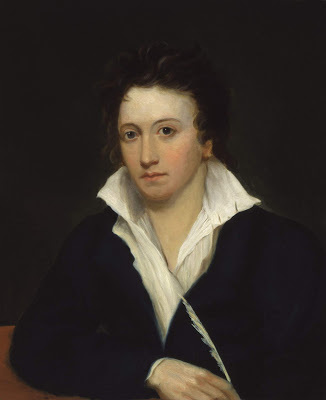
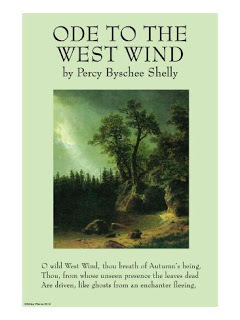 It's looking wintry out there.
It's looking wintry out there. As somebody who makes a big fuss out of fall, I really need to be taking these changes in better stride. Autumn is indeed the 'fall of the year.'
Not just leaves. Temperatures are falling. And daylight is diminishing daily, nightly, before our eyes.
The world grows quiet. Where are all those crickets and cicadas that made that enchanting 'Change is in the air/ Hurry up!/Hurry up!' music at the close of each fading day, singing us into the softer beauties of the autumn eves?... Well, don't ask.
So, with these facts well in possession by anybody with experience of a few go-rounds in a temperate climate, what did we expect to come next?
And did I say 'quiet'? Where are the birds? Some are still with us, bearing up with their animal pluck in nature's Hotel Winter, not audibly complaining (more than I can say for us two-legged types).
Some of the feathered friends that are often still with us this time of year, and checking the place out for daily meals, have apparently made the decision to look elsewhere this year, since we were so late to begin filling the feeder. We filled it for the first time just last Sunday.
Score so far: handful of chickadees.
Such observations on our wintry outlook, abetted by cold and damp each day this week, lead to the state of mind in which (quotes start here) we "We look before and after,
And pine for what is not"...to borrow a few words from the poet who will supply us with a good deal more shortly. As for looking back, this is a fond occupation (I am told) of advancing years. (Laughter off.) Perhaps even more universal is our tendency to look forward to the next desired status. Having "something to look forward to" seems to be a pretty universal desire. My mother used to say of one or another prospective gathering: "it's something to look forward to." Even in our happiest best of days, we keep an eye on something fun, desirable, or at least distracting -- coming up. See you, we say to friends or relations, at (or on) such and such. And pretty universally in the countries of our climate, when winter is full in the mirror (not yet, of course, in the present case) we look ahead to that something better that goes by the name of spring. Here's the line of poetry that for most of us pretty accurately expresses that common feeling: "If Winter comes, can Spring be far behind?"
That oft repeated sentiment -- a one-sentence encapsulation of humanity's fundamental need for hope -- comes at the end of the poem, "Ode to the West Wind," written in Italy in 1819, when Percy Bysshe Shelly and his wife, Mary -- famous as the author of "Frankenstein" -- were living in a town near Florence, Italy.
The West Wind of the poem's conception is a cleansing autumn wind, taking away the "withered leaves" of the old year and preparing the ground for the birth of a new spring.
And in Shelley's poem it's an allegorical wind, driving away a despair that the poet strongly associates with the political decadence and injustice of his own country, England. He has fled England, where his works have been censured and he is liable to prosecution for "blasphemy" -- by criticizing orthodox Christianity -- and "sedition" in condemning both his country's form of government, a monarchy dominated by the upper class, and particular politicians who serve the ends of the entrenched status quo and are blind to the needs and aspirations of the great mass of the common people.
His sonnet "England in 1819" bluntly summarizes his view of the English political system at that time:
"Rulers who neither see, nor feel, nor knowBut leechlike to their fainting country cling,Till they drop, blind in blood, without a blow"... I find a bitter satisfaction in reading these words about another time and place, the England of exactly 200 years ago, and transposing them to our own top rungs of government:
"rulers who neither see, nor feel, nor know"...?
Yep, sounds about right to me.
The final section of "Ode to the West Wind" best expresses the poet's root notion of a strongly cleansing wind, imploring the West Wind to make use of his own sad thoughts (equated with falling leaves) to achieve "a deep, autumnal tone,/ sweet though in sadness... Be thou me, impetuous one!"
And, in the following lines:
"Drive my dead thoughts over the universe
Like withered leaves to quicken a new birth!"
Then in the ode's very last couplet the cleansing wind becomes "the trumpet of a prophecy!"
"O Wind," the poem appeals in its famous final line, "If Winter comes, can Spring be far behind?"
As I take Shelley's meaning here, Spring -- and all it means: new birth, new season, new growth, flowers, green leaves, crops, food for the whole of earth's population -- doesn't just arrive by itself.
We have to clean all the crap out of the way first. The deadness -- physical and moral -- doesn't just disappear by magic.
That's why we need the cleansing West Wind. That's what the fresh 'wind' -- a word suggesting spirit, urge, energy, a strong popular movement (or whatever other interpretation we wish to give it) -- does.
And that's why this West Wind of Shelley's poetic conception speaks to me so strongly at this particular time in this sorrowful, sickening land of our own, stewing in its corruption, decadence, cruelty and blatant cold-heartedness toward those in need.
Also, frankly, it feels good simply to read, and re-read, a poem about hope.
Published on November 21, 2019 17:31
November 14, 2019
The Garden of the Seasons: "That Time of Year" -- Shakespeare's Sonnet and Our Novembers
 This is Shakespeare's Sonnet 73 (posted in full below the photos) known to me and to others by its first few words "That time of year," one of those simple phrases that because of the genius of the poem to which it is connected is now iconic.
This is Shakespeare's Sonnet 73 (posted in full below the photos) known to me and to others by its first few words "That time of year," one of those simple phrases that because of the genius of the poem to which it is connected is now iconic.Well, now we are at 'that time of year.'

Here's Shakespeare's Sonnet 73:
That time of year thou mayst in me behold When yellow leaves, or none, or few, do hang Upon those boughs which shake against the cold, Bare ruin'd choirs, where late the sweet birds sang. In me thou see'st the twilight of such day As after sunset fadeth in the west, Which by and by black night doth take away, Death's second self, that seals up all in rest. In me thou see'st the glowing of such fire That on the ashes of his youth doth lie, As the death-bed whereon it must expire, Consum'd with that which it was nourish'd by. This thou perceiv'st, which makes thy love more strong, To love that well which thou must leave ere long.

When we discussed this poem in a graduate school course taught by the estimable Helen Vendler, widely regarded as the country's best critical reader of contemporary American poetry (and possibly on everything else written in English as well), she asked us to pin down precisely what time of year the poem was evoking -- pointing out the exactitude with which Shakespeare identifies it: "When yellow leaves, or none, or few, do hang/
Upon those boughs which shake against the cold."
We are given three depictions of the state of the autumnal "turn" -- yellow leaves, or none, or few. And this is in fact the stage of late fall that we all observe. Some trees still hold at least a few of their "autumn" tinted leaves -- yellow, orange-yellow, reddish orange, a few true reds. But there are many fewer than were there a couple of weeks ago. We're at the end of the season that many of us find glorious, the 'crowning' of the year, a spectacular natural show in fortunate realms such as New England and, I suspect, parts of Shakespeare's old England.
But now the landscape, our world, feels different. We're cold and walk faster; wear heavier clothes. All the oaks' acorns are on the sidewalk. Neighbors have had their -- I almost said 'rakes' -- but of course what I should say is 'leaf blowers' out. While some lawns are 'raked' clean, patches of sidewalk here and there are mounded high with leaves.
But they never come down all at once. Some trees are bare. Some trees are still turning. And many are holding on to the poem's a "few" leaves.
The exactitude of this portrayal is important because this is a poem not about the height of glory, and not about defeat, death, or the symbolic 'death' of winter's frozen landscape -- but about the transitional, or transitory, period of time when we know all that is coming. Here is a persistent truth about life -- human, and natural: it's always in transition. Always transitory.
Yet this is the time of a year when we can least well avoid noticing it. It's not 'autumn' any more. It's late autumn; winter's eve. We can't help feeling the change and understanding what it means.
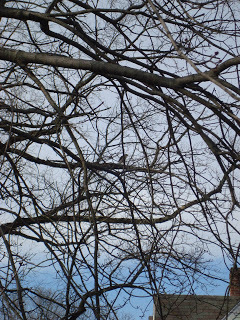 So then the poem's speaker makes what now feels like an inevitable comparison between 'that time of year' and himself.
So then the poem's speaker makes what now feels like an inevitable comparison between 'that time of year' and himself. He's in the twilight of his maturity. The speaker doesn't, with delicacy, go into details of personal appearances. But we can guess them: He's losing his hair. Flesh sagging. He prefers metaphor to physical description:
"In me thou see'st the twilight of such day
As after sunset fadeth in the west...
In me thou see'st the glowing of such fire That on the ashes of his youth doth lie..."
Twilight is of course beautiful, but you know it's not going to last that long. So, the poems appears to be saying, you may still like what you're seeing, but you know it's not going to last. It's like the late glow of an expiring fire. If you've made any fires in a fireplace you know this is what you see. And, as the poem shows through this comparison, our own span of existence is "Consum'd with that which it was nourish'd by."
We die, in the end, from living. We are the fire.
And still, as we read in the poem's great coda -- those final two lines -- "which thou" (a stand-in, I believe, meant to apply to all of us human creatures)
"...perceiv'st, which makes thy love more strong, To love that well which thou must leave ere long."
Actually, I feel that same way about "that time of year" -- November. I hate the coming cold and the steady loss of daylight, but I love the world's fading beauty and those profound, nostalgic November twilights.
I can't remember what more there was to analyze, explicate, or even talk much about in this short masterpiece, except that every word is perfect.
...Except, on second thought, one interesting historical note: In line 4, the poem compares the leafless branches of the late autumn trees to "the bare ruin'd choirs."
Unlike today's understanding of the word "choir," the choirs the poem is speaking of refer to the spaces within churches -- a place, not the people -- where the church's picked singers (today's 'choir') would sit or stand ready to sing the psalms or chants or other musical passages that we now call "hymns" -- in Latin. Everything done in church was in Latin when England's churches were built with places for the choirs often high above and behind the altar -- to sing the church's beautiful music, until the Protestant Reformation came along, modestly in some respects under the aegis of King Henry VIII's establishment of the Church of England. Henry's plan was for an English Catholic church. The king would rule it; would own the property; would "dissolve" the monasteries at will if he wanted to take possession of their land and other wealth.
The militant Protestants, who later became the Puritans, took things much further. They banned the Latin, the choirs, and they removed all the music until in the time of Queen Elizabeth, Shakespeare's England held hundreds of old churches where the places for the "choir" singers -- had been pulled down, ruined.
Happily, however, nothing has ruined those leafless trunks and branches, symbolized as "bare ruin'd choirs" by Shakespeare, in the woodlands and shade trees in our lovely late autumn world -- ...yet.
Published on November 14, 2019 13:40
November 5, 2019
Garden of the Seasons: At Home With November
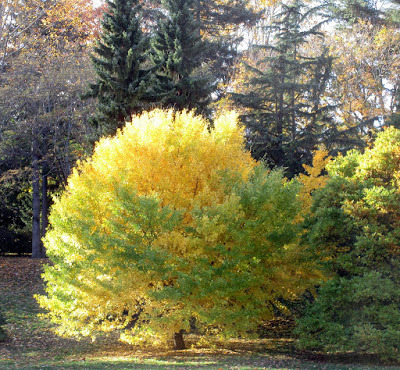 The November Sublime. The tender November light, autumn's second self.
The November Sublime. The tender November light, autumn's second self. 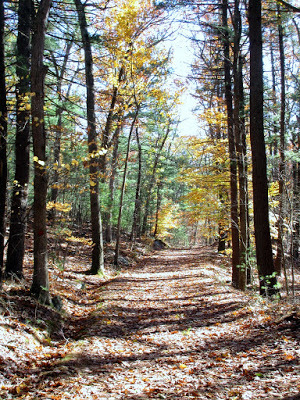 Every season has its characteristic, signature state of mind, emotion, nostalgia, and no doubt regret. Its time-borne expectations. It can be cold, this final month of fall (according to the meteorologists' calculation, if not the astronomers'), but it hasn't been cold yet this year. The season lingers. It's late phase fall. Today's newspaper ran a wonderful panorama photo taken from some elevation high enough to catch a strip of fabulous tree-line through the heart of Boston called the Emerald Necklace. Wonderful, I thought. That's the news. I have a friend who says "for every hour you spend reading or watching the news, spend two hours looking at trees." Sometimes he says "ten hours." This year is shaping up as one of those ten-hour times.
Every season has its characteristic, signature state of mind, emotion, nostalgia, and no doubt regret. Its time-borne expectations. It can be cold, this final month of fall (according to the meteorologists' calculation, if not the astronomers'), but it hasn't been cold yet this year. The season lingers. It's late phase fall. Today's newspaper ran a wonderful panorama photo taken from some elevation high enough to catch a strip of fabulous tree-line through the heart of Boston called the Emerald Necklace. Wonderful, I thought. That's the news. I have a friend who says "for every hour you spend reading or watching the news, spend two hours looking at trees." Sometimes he says "ten hours." This year is shaping up as one of those ten-hour times. 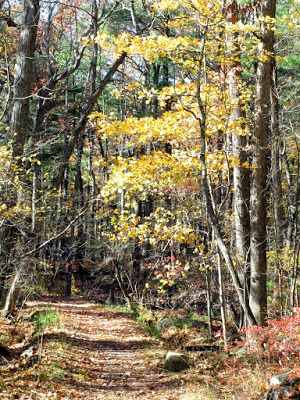 Anne and I logged some happy hours last week walking with trees through some of our favorite Eastern Massachusetts haunts, paying two visits, from separate starting points to the Blue Hills Reservation, a state park that is one of the great treasures of the Greater Boston region.
Anne and I logged some happy hours last week walking with trees through some of our favorite Eastern Massachusetts haunts, paying two visits, from separate starting points to the Blue Hills Reservation, a state park that is one of the great treasures of the Greater Boston region. 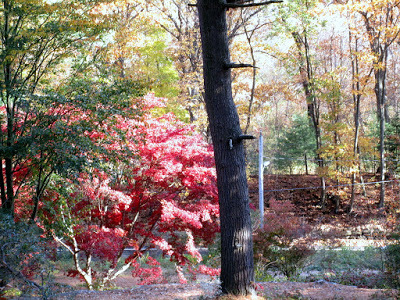 You can hear the traffic when you begin the dirt path into the forest -- (shown in the second and third photos down) and then, in a matter of few minutes, you can't hear it any longer. Our 'real world' is out there in the traffic. The planet's 'real world' is in here, among the trees. Its soundtrack is subtle. Silence, or almost silence, at times. The occasional bird this time of year. Something of an insect sound; a last cricket somewhere? (Nobody tell him it's all over.) It's squirrel time, of course, but less obviously in wild places than in our neighborhoods, where competition breeds chatter. In the woods, there are plenty of trees for everyone. Trees don't speak much, unless the wind is up.
You can hear the traffic when you begin the dirt path into the forest -- (shown in the second and third photos down) and then, in a matter of few minutes, you can't hear it any longer. Our 'real world' is out there in the traffic. The planet's 'real world' is in here, among the trees. Its soundtrack is subtle. Silence, or almost silence, at times. The occasional bird this time of year. Something of an insect sound; a last cricket somewhere? (Nobody tell him it's all over.) It's squirrel time, of course, but less obviously in wild places than in our neighborhoods, where competition breeds chatter. In the woods, there are plenty of trees for everyone. Trees don't speak much, unless the wind is up. 
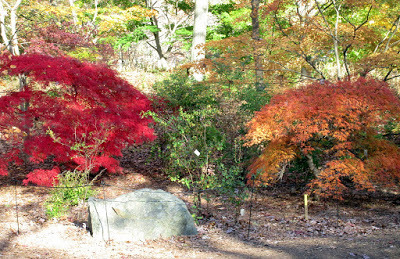 That the wind has spoken this season, considerably on occasions, is clear. We see evidence of that on the news, and see the footage of trees that came down to cut power or, sadly, cleave roofs. We see the signs in the Blue Hills forests as well, where occasionally a great old trunk, or simply a once-strong branching has crossed the path. If the fall is recent, and of significant weight, it's likely that no one has cleared it, and so we make our own paths around these blockages, no great nimbleness required. The photographic footage of trees falling on our houses or power lines may give the impression that nature is a destructive force. Unfortunately, many of our neighbors appear to think this way. They want trees around their houses cut down. They search the city's street trees for signs of age, weakness, disease; an excuse for removal. It's like pulling your teeth out to prevent cavities.
That the wind has spoken this season, considerably on occasions, is clear. We see evidence of that on the news, and see the footage of trees that came down to cut power or, sadly, cleave roofs. We see the signs in the Blue Hills forests as well, where occasionally a great old trunk, or simply a once-strong branching has crossed the path. If the fall is recent, and of significant weight, it's likely that no one has cleared it, and so we make our own paths around these blockages, no great nimbleness required. The photographic footage of trees falling on our houses or power lines may give the impression that nature is a destructive force. Unfortunately, many of our neighbors appear to think this way. They want trees around their houses cut down. They search the city's street trees for signs of age, weakness, disease; an excuse for removal. It's like pulling your teeth out to prevent cavities. 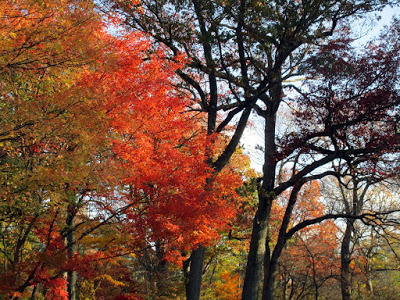 But trees, and great nature itself, are not a destructive force, but a creative force. We wouldn't be here without them. Trees created our world; they made the atmosphere breathable for the 'higher' (or more complex) animals, such as ourselves. They take carbon dioxide out the air and return oxygen to it. Their roots force seams through the rock, helping to make earth. Without plants and the microscopic allies turning rock into soil for a billion years, we wouldn't be able to grow food. We would have only the ocean to feed us, and how soon would we eat all the fish? (Oh, yeah, we're all ready doing that.)
But trees, and great nature itself, are not a destructive force, but a creative force. We wouldn't be here without them. Trees created our world; they made the atmosphere breathable for the 'higher' (or more complex) animals, such as ourselves. They take carbon dioxide out the air and return oxygen to it. Their roots force seams through the rock, helping to make earth. Without plants and the microscopic allies turning rock into soil for a billion years, we wouldn't be able to grow food. We would have only the ocean to feed us, and how soon would we eat all the fish? (Oh, yeah, we're all ready doing that.) And they beautify the face of the planet. Most of the other photos on this page came from the face of November as it appeared in the Arnold Arboretum in Boston on Sunday, the first day of the return to standard time. The arboretum is a living laboratory for the Harvard University forestry school, and an amazingly curated collection of world-class trees.
Spending time among the trees -- whatever the apparent motivation: exercise, fresh air, aesthetic appreciation -- helps us understand their story.
Yes, the trees are talking to us. It costs absolutely nothing to listen.
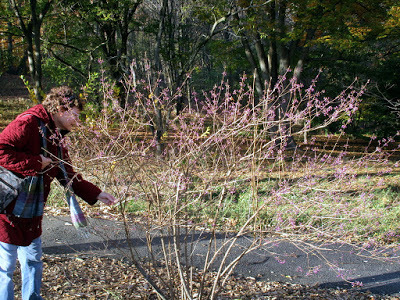 Anne is seen is this photo examining a plant which I've certainly never seen anywhere else, called, fittingly enough "Purple Berry Bush." The tag says it's from Korea. It also bears of course a Latin botanical name, but I didn't recognize any of those terms.
Anne is seen is this photo examining a plant which I've certainly never seen anywhere else, called, fittingly enough "Purple Berry Bush." The tag says it's from Korea. It also bears of course a Latin botanical name, but I didn't recognize any of those terms.  We were looking for Larch trees on our visit to the arboretum, having learned from previous visits that the Larch is a member of the conifer family whose leaves turn orange in the fall and then fall off, like deciduous trees. That is, it's an "evergreen" whose leaves are not 'evergreen.' You can glimpse one in the middle distance of this photo.
We were looking for Larch trees on our visit to the arboretum, having learned from previous visits that the Larch is a member of the conifer family whose leaves turn orange in the fall and then fall off, like deciduous trees. That is, it's an "evergreen" whose leaves are not 'evergreen.' You can glimpse one in the middle distance of this photo.
Published on November 05, 2019 11:36
October 24, 2019
By the Numbers: An Album of October Moments
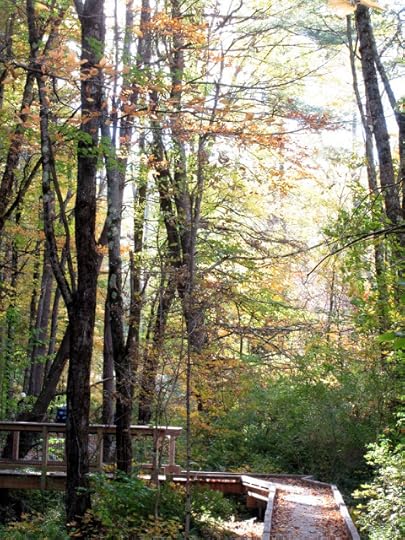
Here's a poem I wrote last year in an attempt to capture the feeling of autumn as a homeland of the human heart.
Searching For Home
We pass through two fields,
but it feels like more,like all the fields in heaven and on earth, because our path has been gilded by golden light on golden fields Butterflies, monarchs of the open meadow, pass among the goldenrod,and twine around one another, and spin off on their own questsAbove: the fertile green of a lavish regionHillsides extend their flankslike the green man of the forest reaching for the sky,embracing the valley in which we proceedon our regal, healing progressAnd higher still, beyond the deep and furry green of the treelinethe rich blue vault holds the sun in its placewhile evolving nuances of air linger like forgiveness, teaching us to be as we are and should be,Creatures who breathe in and let it out.
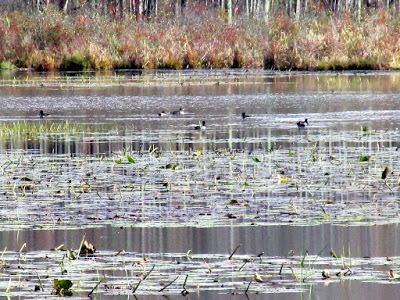 This year I'm trying to use this space to compile a photo album for the weekend of Oct. 12-14, in four parts:
This year I'm trying to use this space to compile a photo album for the weekend of Oct. 12-14, in four parts: 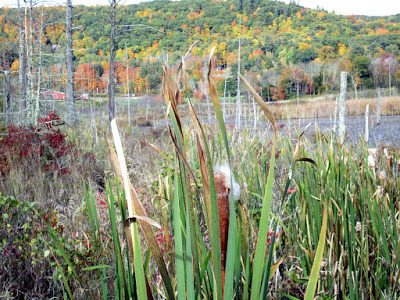
1. The boardwalk in Parson's Marsh, found off Under Mountain Road (in Stockbridge and Lenox). Pictured in the top photo, the boardwalk allows you to walk into a wetlands without damaging the environment or needing rubber boots (which also damage the wetland). It leads through the trees, past the dense shrubbery and out to the cattails and sword-grass, where a railed viewing platform gives you a view of open water, water fowl, the woods and hills on the other side of the water, and the bare trees at the water's edge where we saw nests last year.
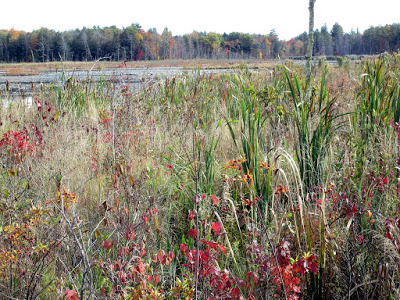
2. Photos of Pleasant Valley Wildlife Sanctuary in Lenox. The first of these images below depicts fall colors reflected in the water of Pike Pond. Then two images of the sanctuary's Beaver Pond: some open water with surface vegetation; and a view of how the steady year-after-year incursion of wetland plants narrows the remaining coves of surface water. Finally a view of the mountainside, at the bottom of this page. For more about Pleasant Valley, see the previous post at https://prosegarden.blogspot.com/2019/10/autumns-garden-more-light-on-october.html
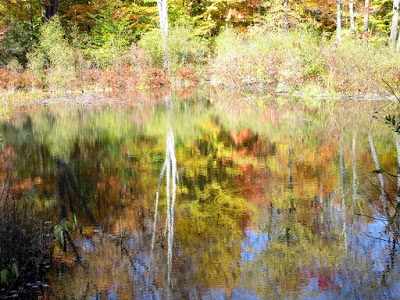
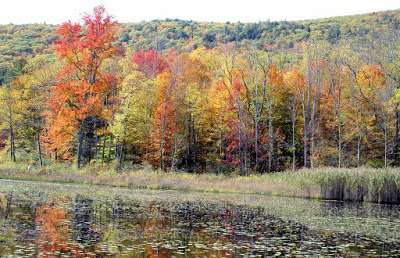
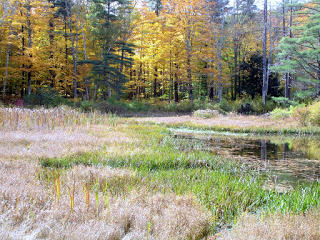
3. Photos of Bullard Wood, which wraps around a carefully maintained path that takes visitors down to the banks of Stockbridge Bowl and the along the lake, linking up with another lovely preserve called Gould Meadow.
In a bright, late-morning sunny stroll, Anne and I got off the main woodsy, shaded path and explored a long grassy meadow we've somehow overlooked before. We found lots of color in the woodland margins, as shown in the images below. The meadow lead us eventually down to the lake, where we stared hypnotically at the lovely, light-splashed water.
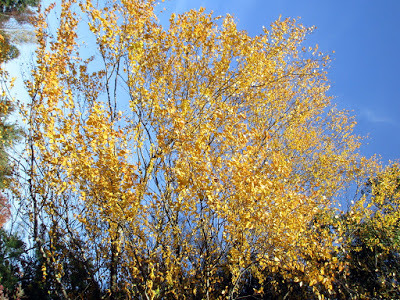

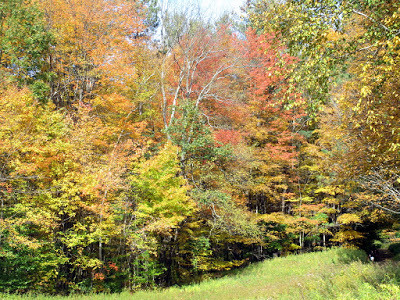

4. On Monday evening, with the sun declining, Sonya and I walked through the a favorite conservation area across the road the Tanglewood, called Gould Meadow. Them we turned into the woods, got a little lost in the gloaming trying to follow a new path that leads visitors to a piece of property owned by Kripalu -- where a prominent sign forbids entrance into private property. We retraced our way back to a path that tooks us down to the Stockbridge lake at a particularly quiet point.
Twilight outdoes itself on this evening: Purpling the night, as the trees sing in the soft exhalations of a seasonal apex and then shake loose a gentle rain of leaves that coat the surface of the lake, like tiny boats on an ancient harbor.
Driving home, just to wrap up the evening, we surprise a black bear on the side of the road. No photos of this encounter. (Unfortunately? Fortunately?) Both bear and humans are happy to go their own way.
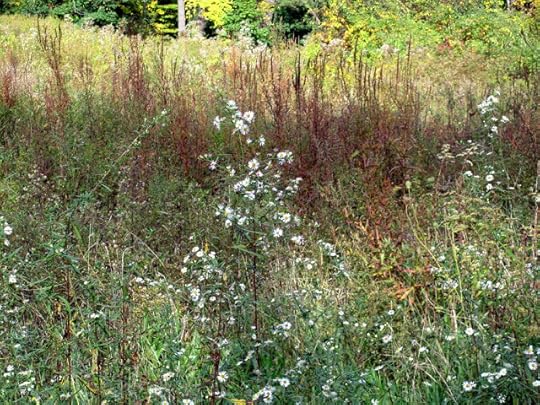
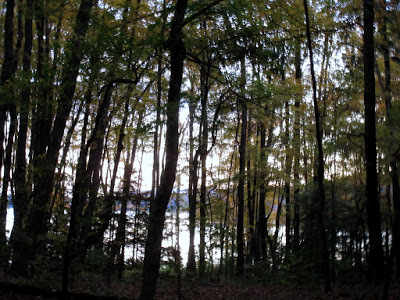
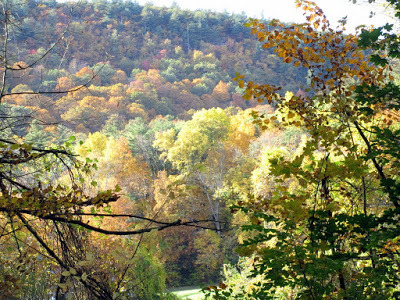

Published on October 24, 2019 07:37
October 19, 2019
Autumn's Garden: More Light on October
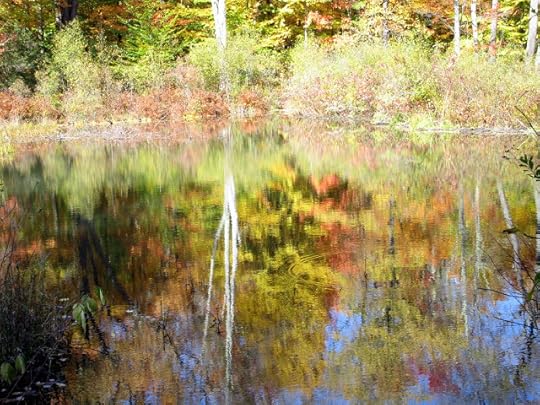
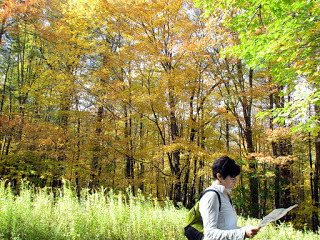
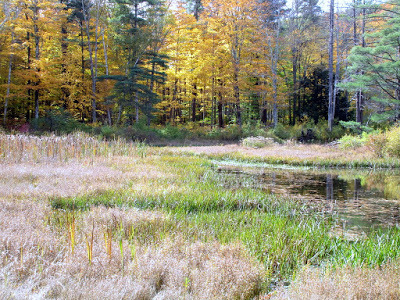 The pond in the picture above is found along the first trail -- there are many -- within the Pleasant Valley Wildlife Sanctuary, a woodland preserve of hundreds of acres that we visited many times when our children will still, well, children. As you can tell from the photo of Sonya looking at the map to plot her next adventure, that was some time ago. For a while, as the kids grew and discovered their own mountains (and cities, and rivers, and preserves, and countries), and we explored new sites in Berkshire County, an ongoing ambition despite all the year we've visited this region -- especially in autumn, occasions that are treated in my household as pilgrimages.... well, the point is we sort of lost track of how much we loved the place.
The pond in the picture above is found along the first trail -- there are many -- within the Pleasant Valley Wildlife Sanctuary, a woodland preserve of hundreds of acres that we visited many times when our children will still, well, children. As you can tell from the photo of Sonya looking at the map to plot her next adventure, that was some time ago. For a while, as the kids grew and discovered their own mountains (and cities, and rivers, and preserves, and countries), and we explored new sites in Berkshire County, an ongoing ambition despite all the year we've visited this region -- especially in autumn, occasions that are treated in my household as pilgrimages.... well, the point is we sort of lost track of how much we loved the place. How varying its landscapes. Woodland walks, ponds, hillsides, little wooden bridges over brooks shiny as they ambled through shaded needle-strewn forest floors. Also paths that run up mountain sides, zig-zagging through mixed deciduous and conifer woodland floors to sites such as the intimidatingly denominated 'Fire Tower,' and whatever you expect to find at the end of the Hermit's Trail.
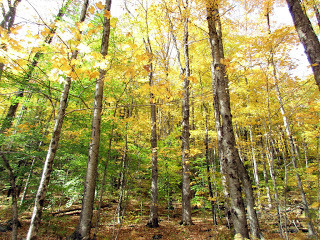
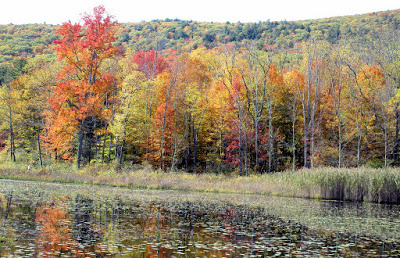 You can pick your elevation. Last week we stayed low, Anne and I restricting ourselves to circuits around two substantial ponds, Pike Pond and the one we call the Beaver Pond.
You can pick your elevation. Last week we stayed low, Anne and I restricting ourselves to circuits around two substantial ponds, Pike Pond and the one we call the Beaver Pond.Pike Pond has narrow, winding trails that pin you close to it low-land banks. The even-leveled footing is good for both young children and unsteady elders. For the second year in a row I was amazed at how much variety in woodland and water and hillside perspective this little trail offers. The top photo, with foliage reflections on the surface water was taken here.
The body of water we call the Beaver Pond was the site where we were first introduced to the unmistakable works of beavers behaving wildly in the wild. Chewed logs and tooth-marks on trees. Those unmistakable humped-up beaver lodges, made of thick limbs and mud and branches with the leaves still on them. And the crowded wetland creations of downed trunks amid broken branches, leaf piles and growing stuff in various stages that serve as the 'dams' the creatures throw together (with their teeth) in the never-ending challenge to create deep-water pools surrounding their lodges and sufficiently expansive to deter predators.
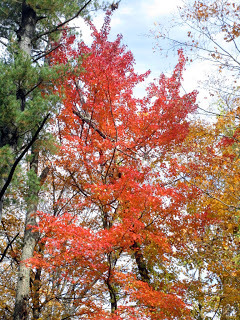 We glimpsed the occasional beaver head back in the day, as I recall, but mostly we saw their works. And now, the decades having mounted, we see those beaver works overtaken by nature's implacable "succession" strategy and turned into wetlands. When we circled the pond this time, we saw more plant-life incursions than open water: Huge pockets of Phragmites lining the banks at several places. Water lilies, a few with ducks sunning themselves in the autumn sun among them; and other wetlands species working away at the earth-creating job of turning water into mud.
We glimpsed the occasional beaver head back in the day, as I recall, but mostly we saw their works. And now, the decades having mounted, we see those beaver works overtaken by nature's implacable "succession" strategy and turned into wetlands. When we circled the pond this time, we saw more plant-life incursions than open water: Huge pockets of Phragmites lining the banks at several places. Water lilies, a few with ducks sunning themselves in the autumn sun among them; and other wetlands species working away at the earth-creating job of turning water into mud. It was all quite beautiful.
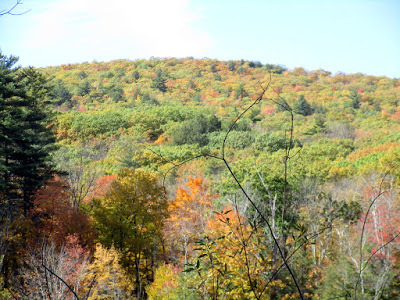 When we made our way clear of the shade of the trees, the views of hillsides and surrounding woodlands opened for us, as in the photos of the bottom of the page.
When we made our way clear of the shade of the trees, the views of hillsides and surrounding woodlands opened for us, as in the photos of the bottom of the page. Last weekend, when we visited, lots of other folks had found their way here too.
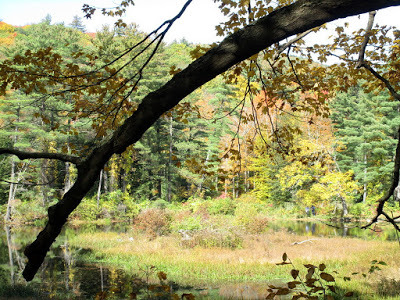
Published on October 19, 2019 17:37
October 18, 2019
The Garden of the Seasons: Putting the "Oh!" back into October
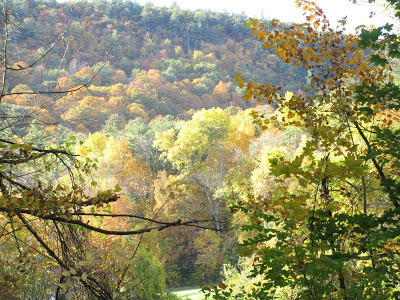

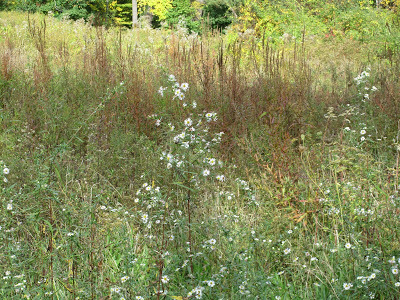 The color over the Columbus Day Weekend -- whoops! I mean "Indigenous Peoples' Day" or some such more enlightened nomenclature -- was the best we've seen in several years. New England fall foliage, a brand name pleasure, a sure source of tourist attention (and dollars), a claim to regional fame, and an almost copyright hold on the month of October, began slipping after a few years of what commentators referred to as "muted" color.
The color over the Columbus Day Weekend -- whoops! I mean "Indigenous Peoples' Day" or some such more enlightened nomenclature -- was the best we've seen in several years. New England fall foliage, a brand name pleasure, a sure source of tourist attention (and dollars), a claim to regional fame, and an almost copyright hold on the month of October, began slipping after a few years of what commentators referred to as "muted" color. TV weather reports used to show maps of the region with percentages penciled in for what percentage of "peak" could be expected in the coming weekend for various parts of the region. Connecticut: 30 percent this weekend. Massachusetts: 60 percent. And up in Vermont this week -- look at that -- 95 percent at peak!
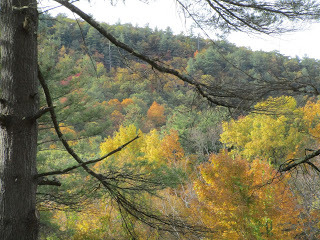 Local wisdom this year, we were told, anticipated a stronger year for brightly colored foliage because the region -- at least in Berkshire County -- received a lot of rain this summer. (Not so much, I can attest, in the Boston and South Shore coastal region.) And on the clear days the color was certainly stronger.
Local wisdom this year, we were told, anticipated a stronger year for brightly colored foliage because the region -- at least in Berkshire County -- received a lot of rain this summer. (Not so much, I can attest, in the Boston and South Shore coastal region.) And on the clear days the color was certainly stronger.My theory is the havoc that rapid climate change is causing to the notion of well defined, predictable "seasons" is eroding the whole notion of "peak" color. Our daughter Sonya, a great fan of our Berkshire Octobers, estimated that about 50 percent of the region's deciduous trees had "turned" last weekend. About quarter of the trees were still to come. And another quarter had already lost their leaves. And in fact all of the woodland trails we walked were well littered with fallen leaves. But still -- lots more up in the trees!
On Saturday of the three-day weekend we visited the Basin Dam trail in Lee, Mass., a Trustees of Reservations property adjoining October Mountain State Forest, where we encountered a party of avid mushroom gatherers happily engaged in a harvest. We followed this up with visit to a new gem created by the Berkshire Natural Resources Council where a short walk, partly over a newly created wood-plank walk leads to a marvelous view of a wetlands called Parson's Marsh, glimpsed in the photo below. Cattails in the foreground, a broad pond with lilies, ducks, and signs of beaver-work in the middle distance, a framing hillside beyond.
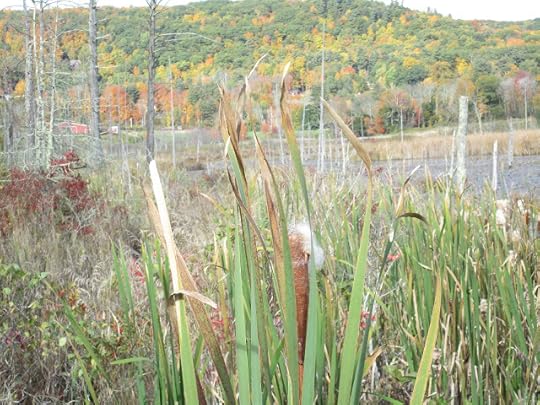

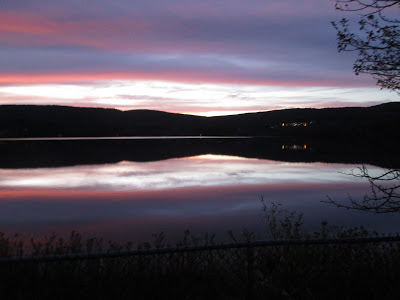 On the way back to the parking area, I took some photos (one of them above) of the foliage along the path in the foreground, backed by the hillside that walls in a favorite Stockbridge-Lenox back road aptly and poetically named Under Mountain Road. Happy are those who live beneath such picturesque contours.
On the way back to the parking area, I took some photos (one of them above) of the foliage along the path in the foreground, backed by the hillside that walls in a favorite Stockbridge-Lenox back road aptly and poetically named Under Mountain Road. Happy are those who live beneath such picturesque contours. That evening (at least I think it was the same day) Sonya and I went down to the lake called Stockbridge Bowl to take in the twilight falling over the hills on the opposite side and on the lake water itself. The few lights faintly appearing in the hillside, and reflected directly below on the lake's placid surface belong to Kripalu, the famed (and pricey) healthy living spa.
That was Day One. More to come.

Published on October 18, 2019 22:21
October 17, 2019
The Garden of Forever: What Trump's Betrayal of the Kurds and the American Troops Who Fought Beside Them in Syria Will Mean for His Afterlife
 Kurdish protesters hold photos of Kurdish political leaders killed by Turkish-backed militias in Syria.
Kurdish protesters hold photos of Kurdish political leaders killed by Turkish-backed militias in Syria.There's a warm place in Forever for People Who Betray Their Allies. Trump’s next stop, after we impeach him, has got to be The Hague. That’s where the International Criminal Court prosecutes war criminals. Because what he’s done to the Kurds in Syria, and to the American soldiers who fought with them, is nothing less than criminal on a breath-taking scale. He makes Benedict Arnold look like a scofflaw. He’s moving straight into Hitler and Stalin territory.
And if he somehow escapes human justice for condemning thousands of human beings to death for fighting for a cause he pompously espoused throughout his campaign and directly after being sworn into office — the defeat of ISIS — we can be sure that divine justice has its eyes on him. Eternity has a place for people just like him. Do you know what the Ninth Circle of Hell is for?Traitors. Those who have committed the sin of treachery.Trump’s decision to do a ’favor’ for fellow-tyrant Erdogan, Turkey’s autocratic president-for-life who regards all Kurds, one of his own country’s largest minorities, as ‘terrorists’ — because doing so is a convenient distraction from all that is wrong with his own anti-democratic governance — is a classic example of those acts that send what Republican politicians used to call “evil doers” (before they embraced one) to the deepest level of Hell. And of all the people to betray — not that the abomination-in-chief would have difficulty throwing anyone and everyone under the bus if he believes it will give him some advantage… Can we recall what the Kurdish armed forces were doing in northern Syria?Defeating ISIS. Remember ISIS? Remember when the whole world was scared stiff of ISIS? What was the first thing out of Mister Bluster’s mouth after he was inaugurated in 2017? “I’m going to destroy ISIS.”Destroying ISIS was a major campaign pledge for Trump. At a campaign rally in South Carolina he bragged, “We are going to convene my top generals and give them a simple instruction. They will have 30 days to submit to the Oval Office a plan for soundly and quickly defeating ISIS. We have no choice.” ISIS’s political state in Syria was by then already well on the way to being defeated — not by Trump, but by a plan put together by the Obama administration, which found that America’s best and only consistently reliable regional ally was the Kurds. Under our leadership, Kurdish armed forces fought ISIS on the ground, while the US supplied air cover and a mere 1,000 ground troops. In close-quarters combat with the fanatic resistance of ISIS’s converts, Kurdish troops suffered 11,000 casualties. They died so that American soldiers did not have to fight that street-to-street and house-to- house battle and suffer the kind of casualties we experienced in Iraq. Shortly before the Abomination in the White House decided to make a fellow autocrat’s day by giving him free reign to score points at home through destroying some of his country’s favored scapegoats — the independent-minded Kurds — Kurdish forces dismantled defensive positions along the Turkey-Syria border under assurances from the US that we would never permit a Turkish assault on them. And then the Bumbler, for no particular reason besides earning a reciprocal kickback from a fellow would-be dictator, said, “OK, I’ll get our guys out of your way. Knock yourself out.”While White House apologists said they were shocked that Turkey began bombing homes and hospitals in the very region of Syria that had been liberated by the Kurdish-led Syrian Democratic Forces, the army that took down ISIS rightly called Trump’s decision to withdraw American troops a “stab in the back” and made clear it felt betrayed by the US. The Boston Globe this week quoted a local Kurdish resident, born in Turkey, calling the Turkish attack on northern Syria “a genocide… As we speak, bombs are being dropped in front of houses.” [ See https://www.bostonglobe.com/metro/2019/10/15/kurds-veterans-denounce-trump-decision-withdraw-troops-from-northern-syria/S5HImWDBYPYkD9jjO8MGiI/story.html] The abandonment of the Kurdish forces who defeated ISIS has also outraged American military veterans. A Congressman who served in both Iraq and Afghanistan, Seth Moulton (D-MA) termed the Turkish attack on both military and civilian facilities a “barbarity…. “ He called it “disheartening” for American soldiers on the ground “to have a commander in chief that you can’t trust and who doesn’t live up to our values and is ordering us to retreat.” A commander we can’t trust? Who betrays allies? What can we call this conduct? Treachery, perhaps? And it has practical consequences. ISIS prisoners guarded by Kurdish forces who now find themselves under attack by Turkey’s American-supplied air force are now escaping. And once Turkey launched the assault on the Kurdish positions that everybody in the world knew was coming if the US withdrew its troops — everybody, that is, except the bumbler-in-chief, who boasted, baselessly, that he would destroy Turkey’s economy if Erdogan were to launched the invasion that he has in fact launched — news organizations on the ground in northern Syria began publishing photos of Kurdish officials, both men and women, who have been captured and promptly executed by Turkish forces. [See the photo above.] The blood of those murders is on Trump’s hands. The blood of all the deaths now taking place in the corner of Syria liberated from ISIS by the American-Kurdish alliance is on Trump’s hands. And on America’s hands, because in a democratic political system, we are all responsible for our government’s actions. In a democratic system, our leaders act in our name. Let’s remember how we got here. We allowed Trump to become President — many of us by voting for a conman whose moral and intellectual shortcomings were pretty well exposed during the campaign. We allowed him to occupy the most dangerous (because most powerful) office in the world even though he lost a popular vote, and even though our electoral system was hacked and influenced by a foreign government (Russia's) that fully intended to do us harm by placing its stooge in the White House. And whose conduct Russia correctly predicted could be influenced to favor their best interests rather than ours. We allowed our antiquated, undemocratic “electoral vote” — a system unfairly weighted in favor of voters from less populous, more rural — and more white — voters, and against more pluralistic and more populous regions, to choose the loser over the winner of the popular vote. And we permitted this losing candidate to win by allowing these one-party Republican-controlled states to employ suppress various dodges and bureaucratic strategies to suppress the vote of their non-white and poorer citizens. That is to say that the American people, and its government, allowed a deeply flawed, hacked, manipulated electoral process to enable an illegitimately chosen, dishonest sicko to take the reins of power at the head of the nation’s government. We have allowed the voter suppression outrage to go on for years. We continue to allow it today. That’s on us. I’m not sure which circle of hell prepares a warm welcome for those who permit evil to be done by the betrayers, the worst of the worst of the world’s sinners, but that’s where we belong. Because that’s what we’ve allowed to happen. I speak these disconcerting truths as one of the privileged, self-loving American majority unwilling to risk blowing up his contented life in order to confront our current illegitimate administration with massive and ceaseless acts of civil disobedience. And if the survivors of the terrorist ISIS state -- freed by the attack on the Kurds -- somehow make their way into this country to blow up ‘innocent people,’ we deserve it. Because we’re not innocent. Trump supporters, especially those who continue to support him, whether he is caging children, destroying the environment, enriching himself, his family and his criminal cronies, or (as in the present instance) betraying allies to their death in full view of the entire world — can step forward and take a special bow. Meanwhile, the Kurdish-led Syrian Democratic Forces have pleaded with the US and its NATO allies to establish a no-fly zone in the north of Syria and “carry out their responsibilities to avoid a possible impending humanitarian disaster.” “This attack will spill the blood of thousands of innocent civilians because our border areas are overcrowded,” the SDF’s official Twitter account said. Guess what our response was? No dice. Then, in a continuation of a long-running media farce — call it “Trump’s Way: Government by Morons and Liars” — news media could not help but devote much of its reporting to the absurd, inaccurate, and morally repugnant rationales offer by our Lying Leader for his disgraceful abandonment of a brave ally. The looniest moment came when the Bonehead in Chief defended his abandonment of an ally by pointing out that the Kurds “didn’t help us in the Second World War. They didn’t help us with Normandy.” Somebody, it seems, has explained to Little Trumpy that once upon a time a big, bad something called World War II happened — despite the sufferings of those with sore feet — and they even dragged his bloated bod to a place called Normandy, where many people who are, admittedly, not Kurds are buried. Putting two and two together and totaling up 48 percent, Trump reasoned that the Kurds could not possibly be called our ‘allies.’ Little Trumpy was quickly hauled into the corridor, crowned with a dunce cap, and instructed in everything wrong with that piece on nonsensical irrationality by anyone who knew anything. In fact, while only four countries contributed soldiers to the Normandy invasion, the Kurds — who did not even possess a country then; and still don’t, according to the Turks — did fight alongside the Allies in their part of the world. OK, we get it. Trump doesn’t know anything about WWII, or history — or anything else that ever happened outside of his limited sphere of personal interests. But while it’s one thing to be ignorant of something, not shutting up about it is just plain STUPID! Yet while the Unimpeached One has a clear leg up on the title of Laughing Stock of the 21st Century, he may also go down in history as the man responsible for destroying anything still good in the American political system. Yes, stupidity can be criminal — when you’re the President of a powerful country. But as for treachery — the betrayal of one’s family or close associates; one’s community or guests; or one’s bonded allies — that’s a high crime in the court of eternity. And the deserved torments of the Ninth Circle of Hell endure forever. The consequences of your crimes, however, as America’s suffering allies now well know, take place in the here and now.
Published on October 17, 2019 15:20
October 9, 2019
The Bulldozer in the Garden. They Came For Our Street... On the Front Lines in Quincy
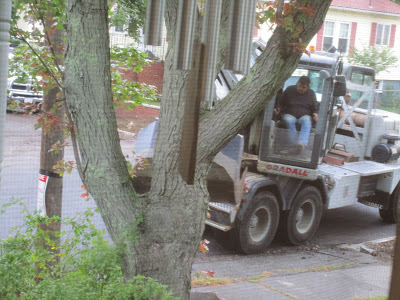 What happens... when the bulldozer and the backhoe pay a visit to your street, and camp out in front of your house, and dig in for a good long stay....? Some friends come by: Steam rollers large and small, dump trucks, steam shovels, an enormous cement mixer the size and shape of a submarine on wheels, and guys with tools big enough to break chunks off of curbstones and pull the roots off trees... and, eventually, men who stand on their shovels.
What happens... when the bulldozer and the backhoe pay a visit to your street, and camp out in front of your house, and dig in for a good long stay....? Some friends come by: Steam rollers large and small, dump trucks, steam shovels, an enormous cement mixer the size and shape of a submarine on wheels, and guys with tools big enough to break chunks off of curbstones and pull the roots off trees... and, eventually, men who stand on their shovels. Posted here are photos of the backhoe ripping up pieces of our driveway (in the cause, no doubt, of replacing them with something better), the crane-like shovel and the dump truck that is receiving fragments of destroyed pavement, the shovel in the act of lifting those driveway blacktop fragments, the monster shovel sending its enormous insect-like proboscis directly our way (where will it stop?), and the guy standing on his shovel, having already removed pieces of the fragile organic life growing too close to the action.
The photos were taken yesterday (Oct. 8), a morning unhappily overwhelmedby the ceaseless machine-age roar of cement-mixers and other monsters of road and side construction industry. It sounds like a war zone, and I don't think we're winning. The action, which continued today (Oct. 9) began back in August, when the machines destroyed the old road by pounding it ceaselessly with an enormous weight to pulverize it into little pieces that were shoveled up into dump trucks and carted away to wherever construction debris goes to pollute the earth we continue to abuse... Much better for the world to tear up the asphalt jungle all around us and allow nature to replace it with a rain forest... or, in our case, a wild New England woodland.
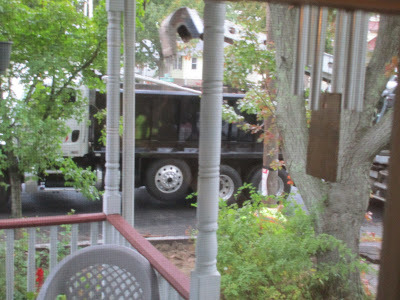
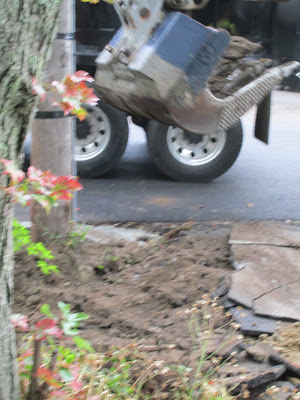
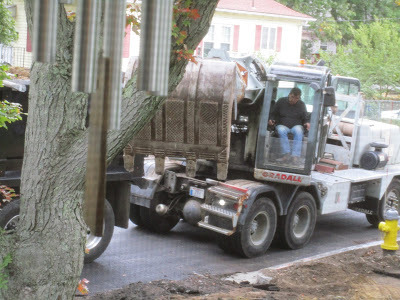
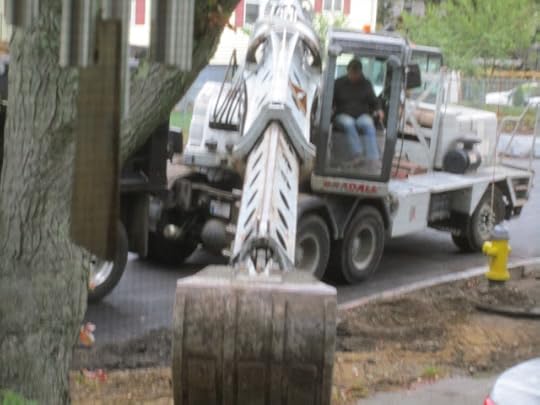
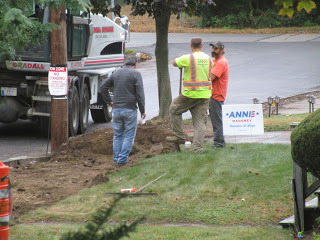
Published on October 09, 2019 09:16
September 24, 2019
The Garden of Verse: Three Poems on the Way It Was (and Sometimes Wasn't) Back in the Day

Three poems from what I might be calling my 'Retrospection Series' -- "How I Missed Woodstock," "Hunting for the Moon," and "Thunder" -- are up on the September Verse-Virtual.com. Here's the bionote I wrote for V-V, attempting to connect all three of these themes to some of the 50-year anniversaries receiving wide attention this year. Because, in fact, the year 1969 was rather packed with events of historical note... And I didn't even mention that on the day of the moon launch, the top story in all the newspapers had to do with a previously little known water-crossing called Chappaquiddick. Anyway, here's the note: "It's been a good year for occasional verse, with 50-year anniversaries everywhere you turn. Somehow I missed the originals. I had no interest in the first man walking on the moon. I missed Woodstock, unable to get time off from a summer job I hated. I'm making up for all that here with poems about my absence from Woodstock, a more recent attempt to pay attention to the moon, and a poem in praise of Dylan's Rolling Thunder Revue, which I also ignored back in the day." I'll reprint the Woodstock poem here:
How I Missed Woodstock
'Uh, have you heard about --?'
Of course, everybody's heard about that
'Wanna go?'
Sure, you think the boss will understand
that for howsoever many days
I may disappear into a fathomless farm-belt upstate wilderness
of corn and soybeans and ultimate grasses
intended for the beasts of the field,
not for the longhaired hominids of the vinyl generation?
You have any idea where we'd park?
And how much did you say it would cost
vis-a-vis a weekly wage for picking plastic stock
in the Rubber Shrubbery warehouse?
...when we can always sit in the mud of your Mama's backyard,
turn our faces to the rain,
drink store brand cola and smoke weed
for pennies on the buck
'Oh... I don't know, maybe
it would be something to remember
when we're like, you know, forty years old
and looking back at our wilder days...'
Wild at heart, but trapped in flesh,
we save our pennies for a nearer treat,
darkening the streets of the broken city
and lamenting the death of a dream:
One green people, at home with
the geist of the zeit and the beasts of the field
To read my other two poems, and poems by the issue's many other contributors, please see http://www.verse-virtual.com/poems-and-articles.html
Published on September 24, 2019 22:20
September 18, 2019
The Garden of Verse: Poets and Authors Get Some Attention
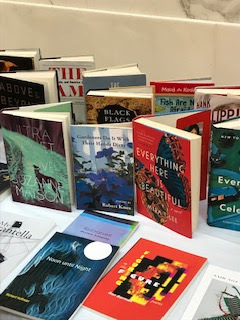 "Reading is essential to democracy," said James Wald, chairman of the Mass. Center for the Book, at the Sept. 17 Mass. Book Awards presentation held in the Great Hall of the Statehouse. Remarkably enough, the state's Constitution agrees, quite explicitly in a section entitled "The Encouragement of Literature, etc." Largely written by John Adams, the Massachusetts Constitution states (Ch.5, Sect.2): "Wisdom and knowledge, as well as virtue, diffused generally among the body of the people being necessary for the preservation of their rights and liberties... it shall be the duty of legislatures and magistrates in all future periods of this commonwealth to cherish the interests of literature..." The legislature and the Mass. Center for the Book carry out that Constitutional responsibility by making annual awards for best books in Fiction, Nonfiction, Poetry, Young Adult and Early Reader categories. With a three-year backlog since its last public presentation of awards, the organization publicly acknowledged winners and other honorees at a large public gathering in the Great Hall of the Statehouse. My 2017 poetry chapbook was nominated for an award, but did not receive any further recognition. I decided to attend (with Anne; hence the photo) and clap for the winner after receiving this stirring communication from event's organizer, following a back-and-forth negotiation over whether the event had room for me or not:
"Reading is essential to democracy," said James Wald, chairman of the Mass. Center for the Book, at the Sept. 17 Mass. Book Awards presentation held in the Great Hall of the Statehouse. Remarkably enough, the state's Constitution agrees, quite explicitly in a section entitled "The Encouragement of Literature, etc." Largely written by John Adams, the Massachusetts Constitution states (Ch.5, Sect.2): "Wisdom and knowledge, as well as virtue, diffused generally among the body of the people being necessary for the preservation of their rights and liberties... it shall be the duty of legislatures and magistrates in all future periods of this commonwealth to cherish the interests of literature..." The legislature and the Mass. Center for the Book carry out that Constitutional responsibility by making annual awards for best books in Fiction, Nonfiction, Poetry, Young Adult and Early Reader categories. With a three-year backlog since its last public presentation of awards, the organization publicly acknowledged winners and other honorees at a large public gathering in the Great Hall of the Statehouse. My 2017 poetry chapbook was nominated for an award, but did not receive any further recognition. I decided to attend (with Anne; hence the photo) and clap for the winner after receiving this stirring communication from event's organizer, following a back-and-forth negotiation over whether the event had room for me or not:Thanks for your RSVP to the MassBooks event at the State House on Tuesday, 9/17. Response to the invitation was swift and robust, and we are in the happy position of being oversubscribed for the event, and we are sorry that you were put on a waiting list. Please know that you are heartily welcomed to attend the event.
In addition to writers and their plus-one supporters, the session was attended by some 15 legislators and a few representatives of publishing houses among a gathering of some 200 aficianados of the book. Among highlights, a special Mass. Literacy Award was presented to Beacon Press, a Boston publisher long committed to publishing works that serve the public good. An award recipient with a national profile, author, Harvard professor, and "New Yorker" staff writer Jill Lepore spoke in praise of an early American book lover: Jane Franklin, Benjamin's better-read sister. When the first US Congress asked Ben what books it needed for its new national library, Lepore recounted, Ben replied, "Why don't you ask Jane?" Lepore also noted that the city of Boston had failed to preserve Jane Franklin's home and suggested that the Mass Center for the Book name its awards after her. Among other honorees who took advantage of the occasion to make a point, poet Ilan Stavans, author of 2018 winner "The Wall" noted the long history of opposition between tyranny and books. "The Chinese emperor who built 'the great wall of China' ordered all the books in China to be collected and burned," Stavan said, "because books cause people to think, and thinking might cause them to revolt." According to the Book Awards press release, "'The Wall' is a poetic exploration...of the U.S.-Mexican wall dividing the two civilizations, of similar walls (Jerusalem, China, Berlin, Warsaw, etc.) in history, and of the act of separating people by ideology, class, race, and other subterfuges." Other poetry awards went to "Vivas to Those Who Have Failed: Poems" by Martin Espada, a 2016 collection that invoked the vision of Walt Whitman and included "a cycle of sonnets about the Paterson Silk Strike and the immigrant laborers who envisioned an eight-hour workday." And to Richard Hoffman, whose volume "From Noon Until Night" received the best book award for 2017. Hoffman told the gathering, "You can't make a living as a poet, but you can make a life." Other titles went on my own ever-growing list of books I mean to read. Notably, the novels "The Unmade World" by Steve Yarbrough, a book set in a time of political and cultural upheaval in the US and Eastern Europe; and "The World of Tomorrow" by Brendan Mathews, a book about three Irish brothers having the best (or the worst) week of their lives in 1939 New York. And too many others to mention. In fact the full list of books honored in the agency's 4-page event program contains a wealth of recommendations for anybody's reading list. State senators and representatives took part in the awards ceremony by presenting honors to the authors in their districts -- in what most certainly have been a grateful bow to the legislators for past assistance and an appeal for future budgetary generosity. One of these worthies, perhaps the rep from Salem, going straight tot he heart of the business, proclaimed that Massachusetts has the most celebrated literary history of any state in nation, praising his state straight-facedly as "the home of authors like Thoreau and Dr. Seuss." Well, there you have it. Thoreau and Dr. Seuss. Who can beat that?
Published on September 18, 2019 09:44



